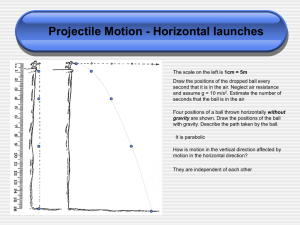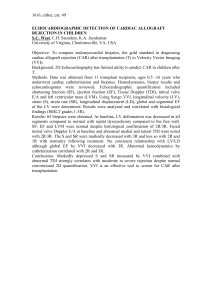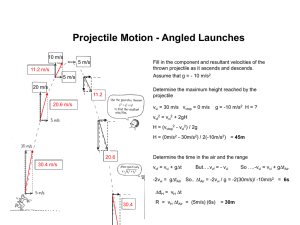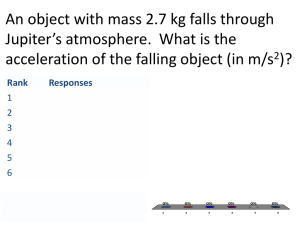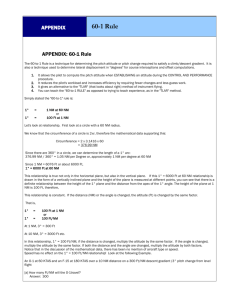Projectiles - Horizontal Launch (PowerPoint)
advertisement
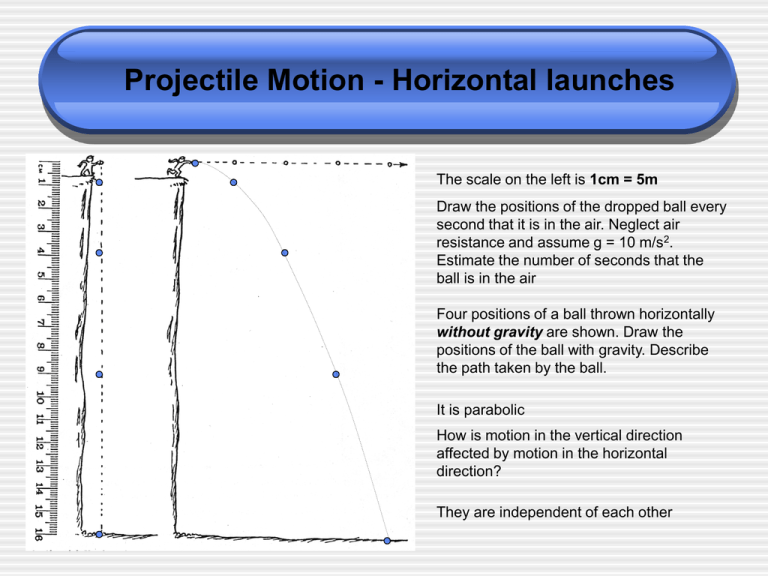
Projectile Motion - Horizontal launches The scale on the left is 1cm = 5m Draw the positions of the dropped ball every second that it is in the air. Neglect air resistance and assume g = 10 m/s2. Estimate the number of seconds that the ball is in the air Four positions of a ball thrown horizontally without gravity are shown. Draw the positions of the ball with gravity. Describe the path taken by the ball. It is parabolic How is motion in the vertical direction affected by motion in the horizontal direction? They are independent of each other Projectile Motion Rules: 1. Vertical Motion is effected by gravity 2. Horizontal motion is constant 3. Motion in the horizontal direction is independent of the motion in the vertical direction. 4. Assume no air resistance Physical Expressions Horizontal vHi = vHf = vH dH = vH t a = 0 m/s2 Vertical vvf = vVi + g t dv = vvi t + 1/2 g t2 a = g = -9.8 m/s2 Example A Falling Care Package The airplane is moving horizontally with a constant velocity of +115 m/s at an altitude of 1050m. Determine the time required for the care package to hit the ground. Example A Falling Care Package dv av -1050 m - 9.8 m/s2 vvf vvi 0 m/s tair ? Example A Falling Care Package dv g -1050 m -9.80 m/s2 vvf dv vvi t gt 1 2 2dv t g 2 vvi tair 0 m/s ? dv gt 1 2 2 1050 m 9.80 m s 2 2 14.6 s Example A Falling Care Package What is the horizontal distance traveled by the care package? dH Example A Falling Care Package dH dH ? aH 0 m/s2 vH tair 115 m/s 14.6 s Example A Falling Care Package dH aH vH tair ? 0 m/s2 115 m/s 14.6 s dH vH tair 115m s 14.6 s 1679 m Example Problem Supposed that you are an accident investigator and are asked to figure out whether the car was speeding before it crashed through the rail of the bridge into the mudbank as shown below. The speed limit on the bridge is 55 mph (24m/s). What’s your conclusion? ? vvi = 0 m/s dH = 24m dv = - 4.9 m g = - 9.8 m/s2 vH = ? dv = vvi t + 1/2 g t2 - 4.9 m = (0 m/s) t + 1/2 (-9.8 m/s2) t2 - 4.9 m t = (2 (-4.9 m) / -9.8 m/s2) = 1 s dH = vH t 24m = vH (1s) 24 m So… vH = 24m / 1s = 24 m/s The car loses speed when it went through the railing so it must have been speeding Example Continued What speed did the car hit the mudbank? Easiest to solve using conservation of energy vTop= 24 m/s hTop = 4.9 m hBottom = 0m g = -9.8 m/s2 vBottom = ? KETop + GPETop = KEBottom + GPEBottom 1/2 m vTop2 + (-mghTop) = 1/2 m vBottom2 + (-mghBottom) 1/2 vTop2 + (-ghTop) = 1/2 vBottom2 + (-ghBottom) 1/2 (24 m/s)2 + (-(-9.8 m/s2) (4.9m) = 1/2 vBottom2 + (-(-9.8m/s2)(0m) 336 m = 1/2 vBottom2 vBottom = 2(336 m) = 26 m/s vvf vH vBottom
